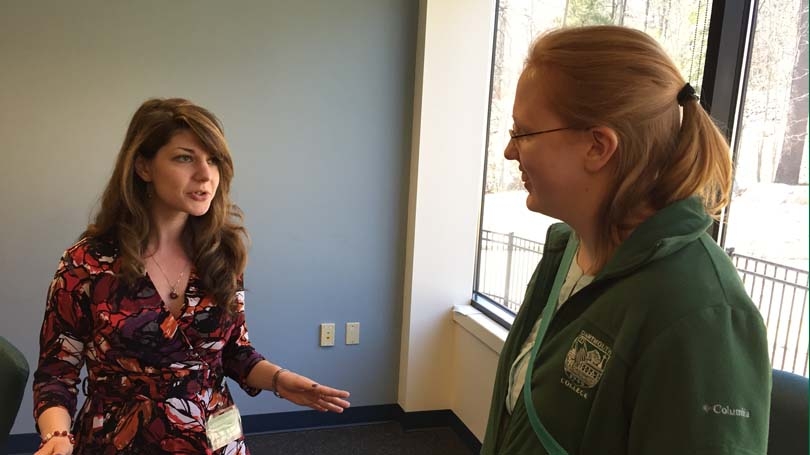
Dartmouth Guarini School alumna, Anda Panaitiu '17, currently at Mascoma, chats with Elora Demarais, a researcher in the MCB program at Dartmouth
Mascoma LLC is a biotech company located in the Upper Valley that focuses on biofuels and cellulosic ethanol production. The company was founded in 2005 by Robert Johnsen and Dartmouth professors Lee Lynd and Charles Wyman. The company was acquired by the Montreal-based company Lallemand in 2014. Mascoma is a corporate research and development site for Lallemand and there are currently about 60 employees at the Lebanon, NH site. On April 24 a group of about a dozen graduate students from Dartmouth, mostly students in the MCB program, visited the site to discuss the pathway from academia to industry.
The event was organized by Janet Fisher, a research associate at Mascoma, who has met with Dartmouth graduate students in the past to discuss careers post-academia and entrepreneurship, including one I attended in January of this year. There is often a gap in the resources and information available about the pathway from academia to industry, and the goal of this event was to share information about that pathway and highlight the importance of networking in career development.
While we were at Mascoma, we got a tour of their facilities and laboratories and got the opportunity to ask questions along the way. We came away with a good idea of what day-to-day activity is like at Mascoma, including a recap of their recent “Yeaster” celebration; an employee-driven celebration of all things yeasty (think food and beverage). After the tour, Ms. Fisher shared a brief presentation about the company and where scientists fit into product development at Mascoma. We were joined by several other employees for lunch and were able to learn about their transition from their academic careers to their current positions at Mascoma. We heard from employees who have been at Mascoma since its founding to those who have been there as few as 3 weeks.
People come to Mascoma with backgrounds in bioengineering, chemical engineering, carbohydrate metabolomics, environmental engineering, industrial microbiology, chemistry, molecular biology, and industrial fermentation. Most of the people we spoke with had masters or doctoral degrees. Some found their jobs through online posting sites, and some found out about positions at Mascoma by stalking their web site. Everyone agreed, however, that networking played a major role in at least one stage of finding their position at Mascoma.
Another suprising piece of information to graduate students was learning we didn’t necessarily need a post-doc to get a position at a company like Mascoma. Some employees we spoke with had completed post-docs and others had not. The employees shared important advice about highlighting our "soft skils": organization, communication, and teamwork go a long way, as does good follow up. Even when you don't hear back from someone, it might be necessary to keep trying. A job interview goes both ways. Not only does the company you are interviewing for want to get to know you, but it’s equally important for you to get to know the company you are interviewing with. Ask questions and learn if the position would be a good fit for you.
This was a very rewarding event. For anyone considering staying in the area after graduation, the visit was a great way to learn more about one of the hidden biotech gems in the Upper Valley. It was also encouraging to see people putting their degrees to use outside of academia, which is something we don’t always get the opportunity to see, and made the pathway of how to get there a little bit clearer